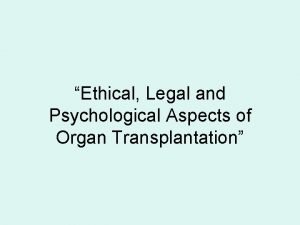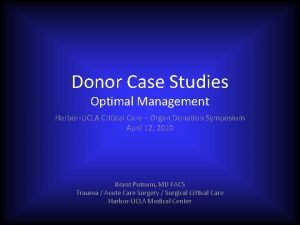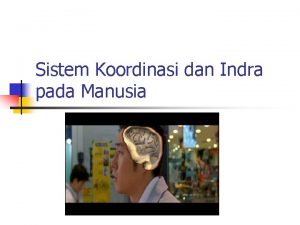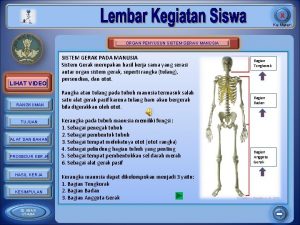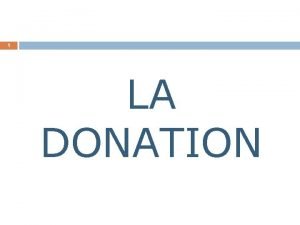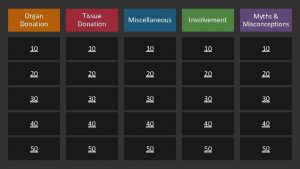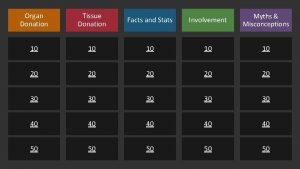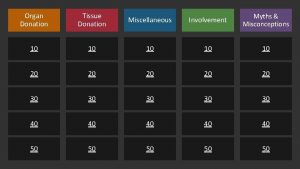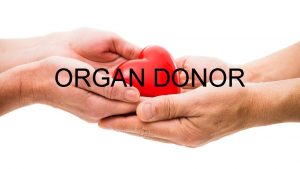Medical ethics Organ donation What is medical ethics












- Slides: 12

Medical ethics – Organ donation

What is medical ethics all about? “Medical ethics is a system of moral principles that apply values to the practice of clinical medicine and in scientific research. ” • Different countries follow different guidelines. • Doctors who fail to act in accordance with concepts outlined by the GMC risk losing their registration.

Examples of need for medical ethics • • • Euthanasia Abortion Mental illness Limited resource problem Genetic screening Animal research

Organ donation • Organ donation is when a person allows an organ of theirs to be removed, legally, either by consent while the donor is alive or after death with the assent of the next of kin. • Donation may be for research, or, more commonly healthy transplantable organs and tissues may be donated to be transplanted into another person.

Opt in or opt out? There are two main types of organ donation schemes: • “opt in” - only those who have given explicit consent are donors • "opt out“ - anyone who has not refused consent to donate is a donor.

Opt-in The opt in system is the one that has been used up until now in England. This is where organs are only donated if the donor registers to donate. If at the time of death he hasn’t registered, his organs are not donated.

Opt-out This is where it is presumed that the person wants his organs to be donated at the time of death, unless stated otherwise. Experiments and observational studies show that making an option a default increases the likelihood that it is chosen; this is called the default effect. Soft/hard: • hard – at the time of death, if unspecified, organs or donated despite families wishes. • Soft – if unspecified, family have final say.

Stats • Germany, which uses an opt-in system, has an organ donation consent rate of 12% among its population, while Austria, a country with a very similar culture and economic development, but which uses an opt-out system, has a consent rate of 99. 98%. • 457 people died in England last year while waiting for an organ transplant. • Countries which have the most donors per head combined the introduction of their opt-out schemes with other changes, like better infrastructure, more funding for transplant programmes and more staff working to identify and build relationships with potential donors before their death.

Countries with interesting policies • Spain - A so-called "presumed consent" legislation was passed in 1979 but donor rates only began to go up 10 years later when a new national transplant organisation was founded which co-ordinates the whole donation and transplantation process.

• Iran has eliminated the shortage of transplant organs through a working and legal payment system for organ donation. • It is the only country where organ trade is legal. • If a patient does not have a living relative or who are not assigned an organ from a deceased donor, apply to the nonprofit Dialysis and Transplant Patients Association (Datpa). The association establishes potential donors, who are assessed by transplant doctors. • The government gives a compensation of $1, 200 to the donors and aid them a year of limited health-insurance. Additionally, working through Datpa, kidney recipients pay donors between $2, 300 and $4, 500. • Importantly, it is illegal for the medical and surgical teams involved or any ‘middleman’ to receive payment. • Charity donations are made to those donors whose recipients are unable to pay. • The Iranian system began in 1988 and eliminated the shortage of kidneys by 1999. Within the first year of the establishment of this system, the number of transplants had almost doubled; nearly four fifths were from living unrelated sources. • It is estimated that a payment of $15, 000 for living donors would alleviate the shortage of kidneys in the U. S

Israel As of 2008, if two patients have the same medical need, priority will now go to the patient who has signed an organ donor card, or whose family members have donated an organ (though medical necessity still takes precedence). This policy was nicknamed “don't give, don't get”. Jews have the lowest percentage, among all other ethnic groups worldwide, of signing organ-donor cards. So while most western countries achieve organ-donor membership of up to 30% of their population, Israel - a predominately Jewish country -remains at 3%. Israel was recently expelled from the European Union Organ Donor Network because, year after year, they accepted organs but didn’t donate organs. There are many mis-conceptions about Judaism’s view on organ donation.

Summary • The new opt-out system hopes to increase the number of donors in England. It was pushed for by the BMA, and supported by many politicians. There will now be a discussion on the issue, with both Jeremy Corbyn and Theresa May pushing for the change to an opt -out system.
 Disadvantage of organ donation
Disadvantage of organ donation Utilitarianism organ donation
Utilitarianism organ donation Organ donation case studies
Organ donation case studies Cells group together to form
Cells group together to form Organ penyusun sistem panca indra
Organ penyusun sistem panca indra Organ berikut yang merupakan penyusun sistem gerak adalah
Organ berikut yang merupakan penyusun sistem gerak adalah Organ and organ system
Organ and organ system Cell tissue organ organ system organism
Cell tissue organ organ system organism Foto rontgen efusi pleura
Foto rontgen efusi pleura Sperm donation greensboro nc
Sperm donation greensboro nc Project proposal for donation
Project proposal for donation Nursing definition who
Nursing definition who Acte de donation
Acte de donation

